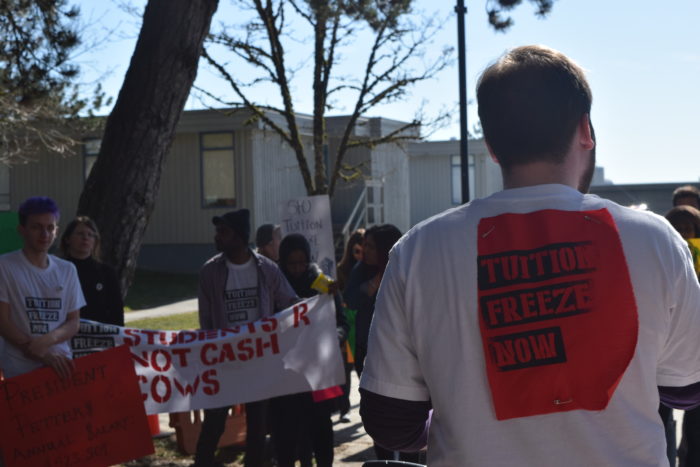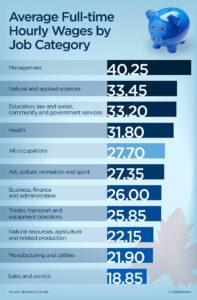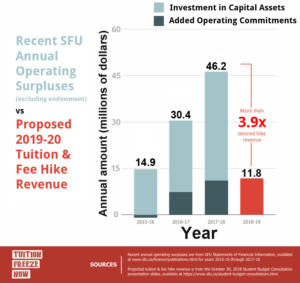
Name: Viraj
Faculty: Sociology and criminology (tentative)
Level of study: Fourth-year undergraduate
Reason for supporting a tuition freeze: A tuition hike is unfair to both international and domestic students
Hello everyone, my name is Viraj and I am currently in my fourth year here at SFU. I transferred from KPU in spring of 2016, where I studied sociology, history, and Asian studies. My intended route of study is a joint major in sociology and criminology (I’m leaning more towards the criminology side of things as I find it much more interesting and applicable). I am currently working two part-time restaurant jobs. Having recently acquired a second job as a cook-in-training, I also work as a waiter to pay my way through school (shout out to all my service industry people past and present; there truly is no other grind like ours).
I genuinely feel that what SFU is doing is wrong to not only existing domestic students, but also to the international student body. They are already forced into paying ludicrously high tuition rates
The reason I support a tuition freeze is simple — I genuinely feel that what SFU is doing is wrong to not only existing domestic students, but also to the international student body. They are already forced into paying ludicrously high tuition rates. Not to mention the myriad of other issues they face simply by being new faces in an unfamiliar country: language barriers, marked social isolation, loneliness, legal barriers that limit what/how often they can work, etc. The criminology student in me will go far as to say that the post-secondary tuition rates for international students constitute a form of legalized extortion, because lectures from a professor, assistance from one/more TA’s, and access to office hours should not cost over two thousand dollars per course. Ever. Not at SFU, nor anywhere else.
I did not wish to offload the burden onto my parents
On the domestic front, things aren’t much better. This is something I can personally attest to, having paid for the vast majority of my post-secondary education myself through a combination of student loans and various part-time jobs. I did not wish to offload the burden onto my parents, who are on the older side (they will both be 62 this year) with a nice list of health problems between them. As such, I also do what I can to pitch in financially with regards to taking care of the home (paying bills, getting groceries, gas money etc.). My family was certainly never “wealthy” by any means, so I learned self-sufficiency and the value of a dollar at a young age. Hell, I still remember 90% of the reason I got my first job at fourteen was simply because I got fed up asking the old man for money (sorry Pa just being real). Now, having recently turned 26, I stress about finances more than ever, often to an unhealthy degree. My work/life balance is tenuous at best.
[Financial issues], plus my own issues with mental health (generalized anxiety and depression specifically) have made not only meeting the cost, but the general demands of a post-secondary education difficult for me.
People ask me all the time about why and how I continue to put so much on my plate. Well, allow me to explain: How else am I going to find the money to pay for school? Save up for a down payment on a home? Build myself a stable financial foundation for the future? Take care of my parents when they are old and sick? Well, admittedly, they’re already old and sick, so time is very much of the essence. These outside factors, plus my own issues with mental health (generalized anxiety and depression specifically) have made not only meeting the cost, but the general demands of a post-secondary education difficult for me.
I’ve considered dropping out several times. If it wasn’t for the consistent encouragement of my parents, a close friend circle, the wonderful staff and various resources at SFU Health and Counselling, and the CAL (Centre For Accessible Learning) who’ve made my time at SFU significantly better, I most certainly would have thrown in the proverbial towel long ago.
My marks have suffered as a result. I’m currently on medication and have taken two others prior to this one. I’ve accessed counselling both inside and outside of school, and recently started using the “MySSP” service that SFU offers all to help me cope. I’ve considered dropping out several times. If it wasn’t for the consistent encouragement of my parents, a close friend circle, the wonderful staff and various resources at SFU Health and Counselling, and the CAL (Centre For Accessible Learning) who’ve made my time at SFU significantly better, I most certainly would have thrown in the proverbial towel long ago. Honorable mentions to Mr. Matthew Menzies (my adviser at the CAL), Father Julio at the Interfaith Centre, and Mrs. Doriana Marello and her “Better Coping” support group which I attended on and off last year. I truly believe she is an angel sent from the heavens to bless us mere mortals on Earth. I strongly urge any/all SFU students to try “Better Coping” if they haven’t done so already.
In summary, I think I speak for all students at SFU (domestic and international) when I say we have had enough. Enough of an overtly greedy and apathetic school administration that continues to strangle students financially with increasingly higher fees. Enough of these so-called “educators” who stand idly by and let all this unfold, and care more about their jobs and personal research than they do the actual students they teach. Enough of underfunded health and wellness resources on campus for students. End this tuition hike now.







